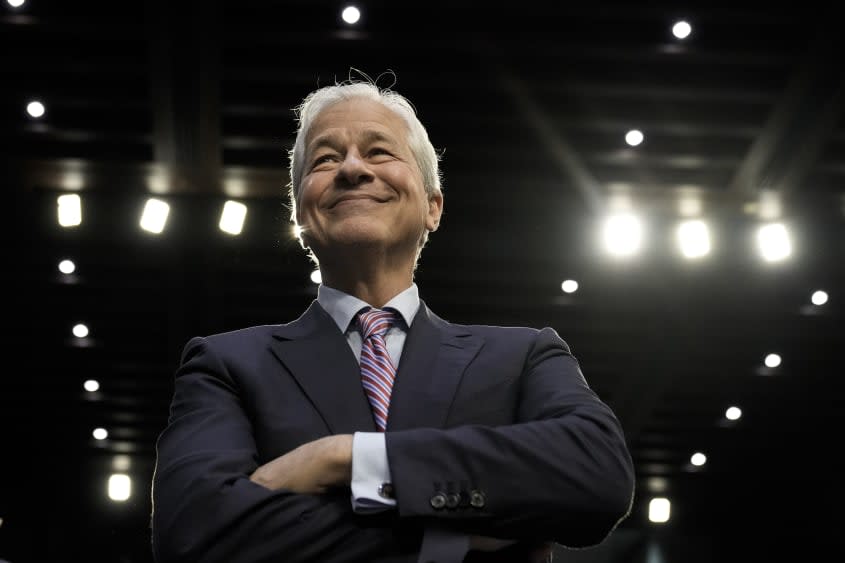Why Jamie Dimon is thinking about the presidency

- Oops!Something went wrong.Please try again later.
- Oops!Something went wrong.Please try again later.
One of America's most famous executives is feeling the political itch. Jamie Dimon, the longtime CEO of JPMorgan Chase & Co. hinted at his ambitions to Bloomberg News. "I love my country, and maybe one day I'll serve my country in one capacity or another," the 67-year-old Dimon said in an interview.
He has at least one enthusiastic backer. Reuters reported that billionaire hedge fund manager Bill Ackman called on Dimon to run for president in 2024. "We need an exemplary business, financial, and global leader to manage through what is likely to be a critically important decade for our country in determining our destiny," Ackman wrote on Twitter. "Jamie Dimon is that leader."
This isn't Dimon's first flirtation with politics. Back in 2018, CNBC reported, the executive set off a flurry of speculation by taking a swipe at then-President Donald Trump. "I think I could beat Trump," Dimon said at the time, "because I'm as tough as he is, I'm smarter than he is. I would be fine. He could punch me all he wants, it wouldn't work with me. I'd fight right back." Dimon passed on a 2020 run, but 2024 is looming, and Trump is the frontrunner for the GOP nomination.
A generational banker
Dimon is the latest in a long line of successful American businessmen who look at the White House and think: "Why not?" During the 2020 election cycle, billionaire Michael Bloomberg became a candidate and Starbucks founder Howard Schultz explored a presidential run, but both bowed out early in the process. Dimon, who has served as both CEO and chairman of JPMorgan since the mid-2000s, certainly has a business that could impress voters: He has built the company into "the world's most reputable bank," The Economist said — and its biggest. He is "the banker of his generation," Euromoney's Peter Lee wrote in 2019.
But Dimon has faced controversy in the job. JPMorgan paid a $13 billion fine to the federal government in 2013 to settle charges that it "overstated the quality of mortgages it was selling to investors in the run-up to the financial crisis" of 2008, Reuters reported. It paid another $200 million fine in 2021, according to The New York Times, for letting workers use their personal devices to discuss company business, which ran afoul of federal financial oversight rules. And there is the Jeffrey Epstein connection: A former JPMorgan executive says Dimon knew about the bank's business with the convicted sex offender, The Wall Street Journal reported, but Dimon denies the allegation. "I don't recall knowing anything about Jeffrey Epstein until the stories broke sometime in 2019," Dimon said.
Dimon has long evinced an interest in politics. But nailing down his partisan leanings isn't so easy. "My heart is Democratic," he told CNBC in 2019, "but my brain is kind of Republican." Last year, he made it clear his heart isn't too Democratic. "I'm not woke," he said.
The odds
Is there a constituency for a Dimon presidential run? His comments about Trump in 2018 provoked an angry reaction from the left, suggesting Dimon-as-candidate would come under fierce scrutiny for his company's role in the 2008 banking crisis and the Great Recession that accompanied it. Because of that, Dimon "has no real shot at becoming president," columnist Andrew Ross Sorkin told Politico. Given the long history of failed presidential candidates from the business sector, Dimon might be "a disaster candidate should he choose to run," Tufts University's Daniel Drezner wrote at his Drezner's World Substack.
If he doesn't run for office, Dimon already has a pretty good day job to fall back on. But his time leading JPMorgan may be nearing its end. After many years of saying he would run the bank "five more years," Dimon recently cut his estimate to "three and a half" more years. "I can't do this forever, I know that," he told investors in May.
Dimon does sound like a man with a campaign platform all worked out, though. In January, he authored a Wall Street Journal op-ed calling on America to "lead with its strengths." That means a rededication to "freedom of speech, freedom of religion and free enterprise," he wrote, while increasing military spending, "thoughtfully" engaging China and developing a "Marshall Plan" for global energy and food security. "Together," we wrote, "we can ensure America's leadership for the next 100 years."
You may also like
Chris Christie: a scandal-plagued presidential hopeful
Chuck Todd to be replaced by Kristen Welker on NBC's 'Meet the Press'

